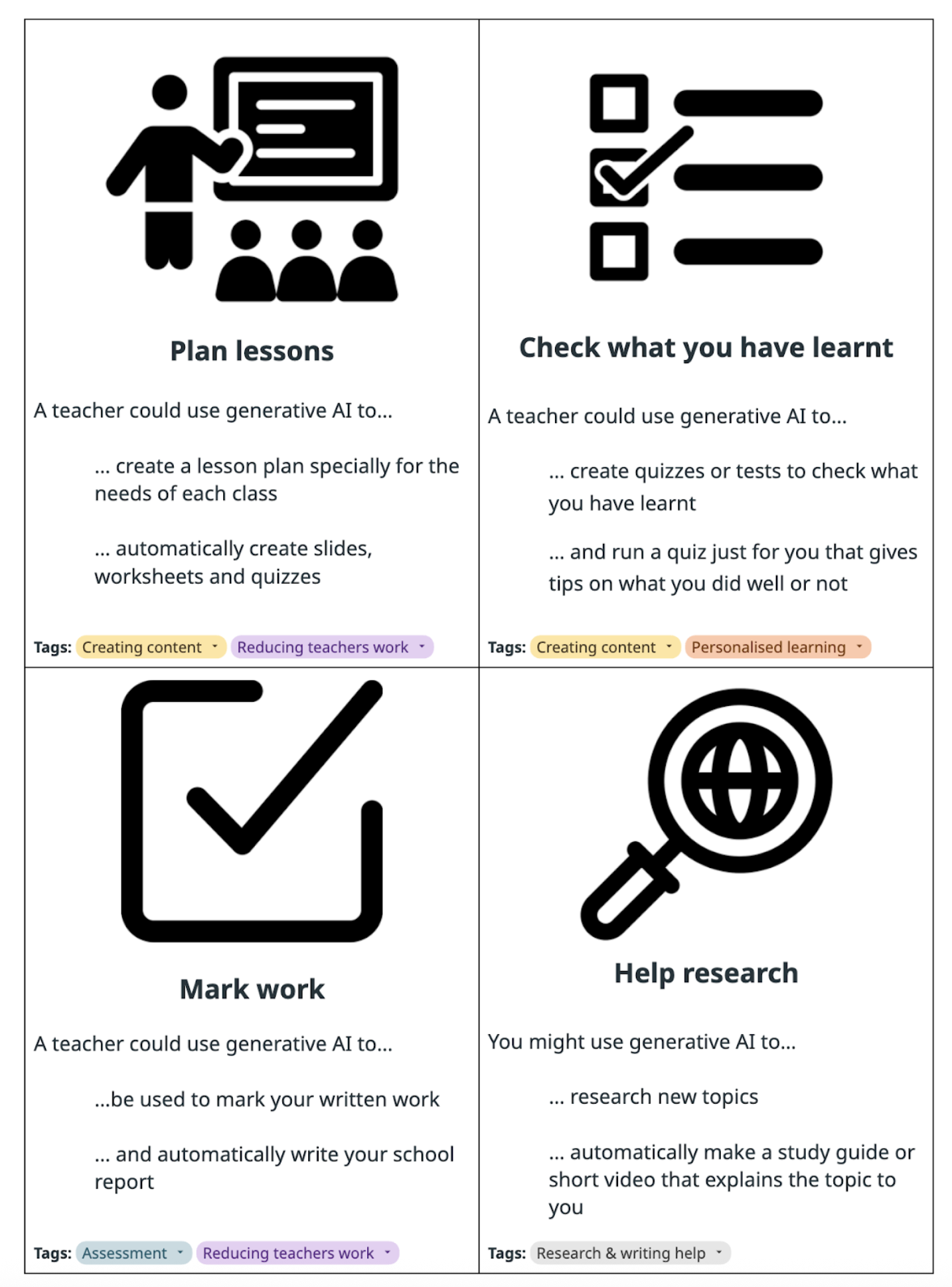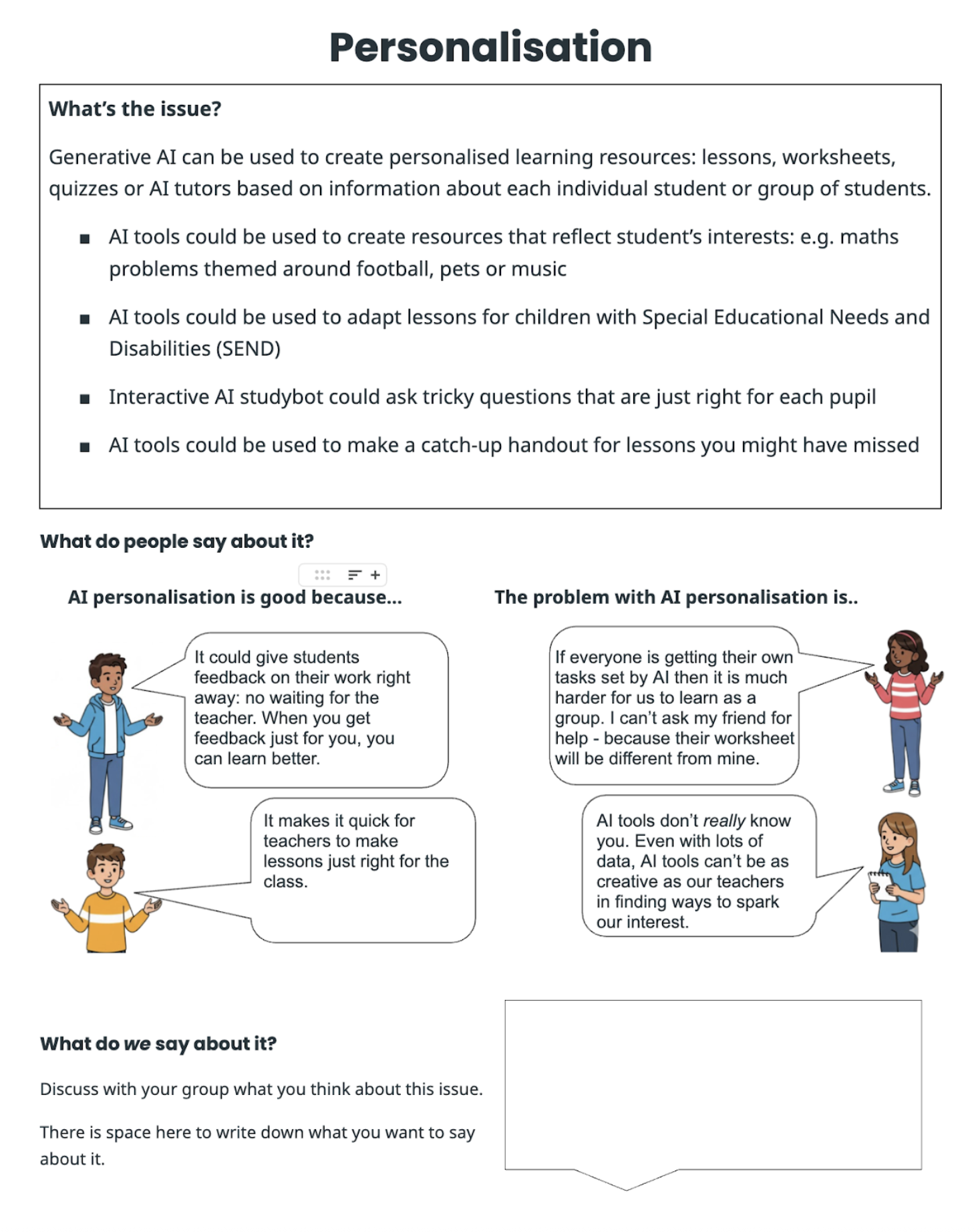Bit and pieces: assembling a workshop in a box on generative AI in education
We’ve been creating a small toolkit to help schools, colleges and informal education settings to discuss Generative AI in Education. This blog post reflects on elements of the development process.
The basic idea has been to create template lesson plans that can be delivered in sessions of between 50 - 100 minutes to support reasonably well informed discussion with students aged 10 - 18 on what decision-makers (and the developers of AI tools and models in particular) should do to shape educational uses of generative artificial intelligence.
Of course, even in a full 2-hour session, there are some big constraints on how in-depth discussions can go - particularly when both teachers/session leaders, and classes/groups will have very different starting points in terms of knowledge and experience of AI.
Over October I experimented with a range of resource and worksheet designs that aim to:
- Surface the different ways in which AI is being, or could be, used in education (tools);
- Explore some of the different critical issues around AI in education (issues).
By addressing issues on distinct handout worksheets, the idea is that a group can either choose to focus on a small number of issues together, or, preferably, divide into pairs or small groups and study each issue - before coming together to debate some big questions about AI in education as a whole.
In putting together these tool and issue resources I’ve tried to pay attention to work from We And AI that critiques the use of anthropomorphic images and language, and to have a distinction between ‘AI tools’ (apps built on top of AI models) and ‘AI models’ (the underlying engines of generative AI tools) to help later discussions target asks to the right place (edTech app builders vs. AI model developers). I’ve tried also to think carefully about agency: using language that highlights who uses a particular AI tool.
One of the biggest challenges so far has been thinking about accessible concepts and language for ages 10+. I quickly realised I needed to draft directly into a worksheet layout, to help think about the length and complexity of texts.
The early mock-ups below show a draft of tool cards and issue worksheets, targeting Key Stage 2/3 comprehension ages. I’ve made some reflective use of AI teaching tools to try and find appropriate language, but I’ve got more work to do on this.


In the issue worksheets, I settled on trying to show there are different views on AI by having ‘for’ and ‘against’ speech bubbles on each topic. In each case, I’ve been scanning the academic literature to try and ground the points in robust evidence, or examples of positions that are genuinely taken. In some cases, this works quite well - but in others it feels a bit artificial, either as there are different weights of evidence on each side of an issue, or the issue doesn’t have a simple ‘two sides’ to it.
Fortunately, I was able to run the drafts past a group of expert reviewers, and with their input revise the statements: in the final iteration dropping the explicit ‘for’ and ‘against’ labelling of points, to recognise that there may be more than two sides to each issue.
Thanks to reviewer feedback I was also able to tighten up some of the language, rejig the agenda, and try to make sure interactive elements of the workshop were pitched right to avoid opening up discussions that were not appropriate to dig into in a general classroom setting.
I was also uncomfortable with keeping the use of AI-generated cartoon placeholder images in the final worksheets, so I was delighted to be able to commission illustrator Imogen Shaw to create bespoke illustrations for the final product.
The resulting resources have now been published on a microsite here: https://connectedbydata.org/ai-in-education/toolkit and we’re looking forward to seeing how they are used over November and December.
